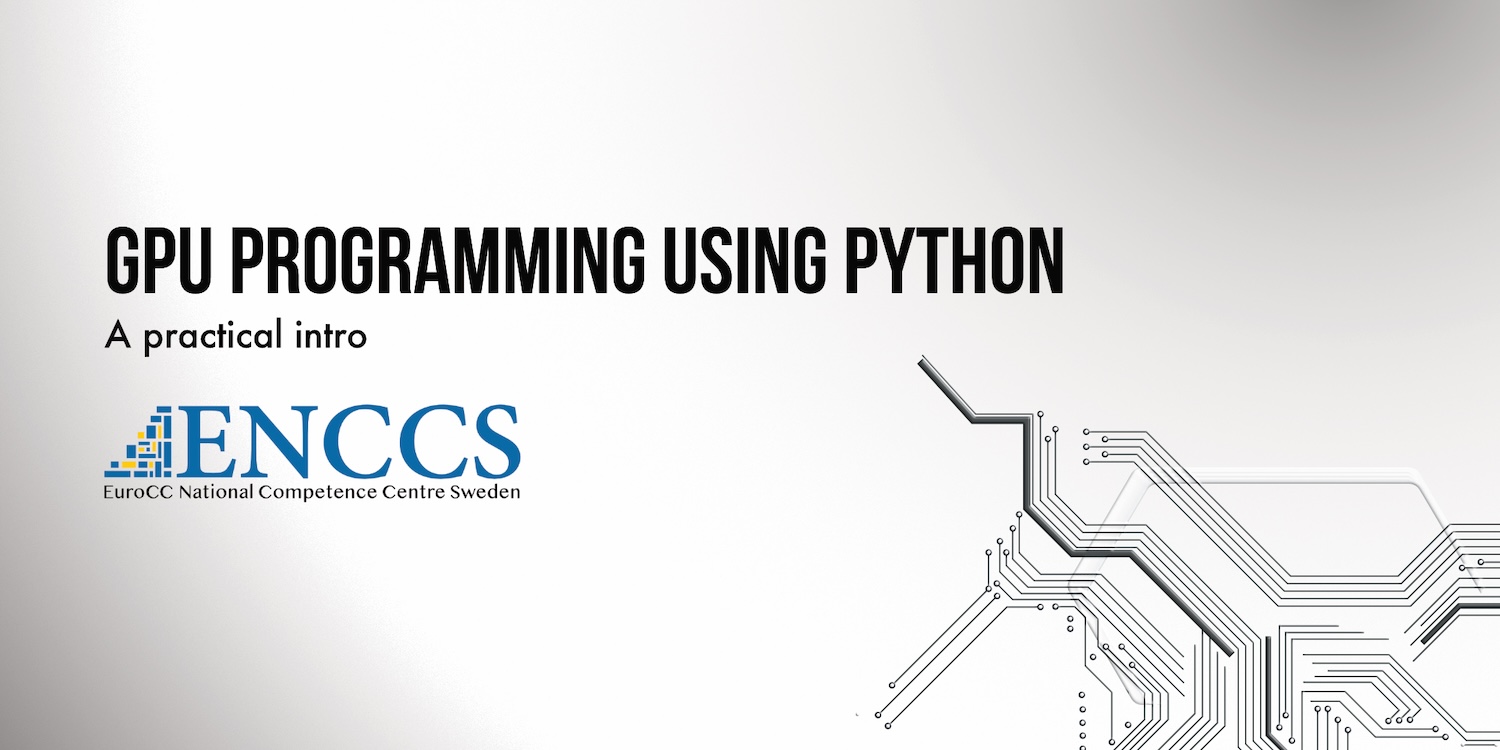
<p style="text-align: center"><b><font size=5 color=blueyellow>Practical Intro to GPU Programming using Python</font></b></p>
:::success
**Oct. 24, 12:00 - 13:30 (CET), 2024**
:::
## General information
:::info
**Links for ENCCS**
- **Website**: https://enccs.se/
- **Events**: https://enccs.se/events/
- **Newsletter**: https://enccs.se/newsletter
- Follow us on [**LinkedIn**](https://www.linkedin.com/company/enccs), or [**Twitter**](https://twitter.com/EuroCC_Sweden), and [**YouTube**](https://www.youtube.com/@enccs)
:::
## Instructors and helpers
:::warning
- **Ashwin Mohanan**, ENCCS/RISE
- **Yonglei Wang**, ENCCS/LiU
:::
## Schedule
| Time | Content | Who |
| :---------: | :----------------------: | :-----: |
| 12:00-12:10 | General Intro to ENCCS | Yonglei |
| 12:10-12:20 | [GPU Programming](https://hackmd.io/@yonglei/intro-gpu-programming-webinar) | Yonglei |
| 12:20-13:00 | Programming using Python | Ashwin |
| 13:00-13:30 | Q/A | |
## Links for documents
- [Jupyter notebooks for presentation](https://github.com/ENCCS/webinar_documents)
- [ENCCS Github Repositories](https://github.com/ENCCS)
- [ENCCS lessons (mermaid)](https://hackmd.io/@yonglei/mermaid-enccs-lesson)
- [ENCCS lessons (mindmap)](https://enccs.se/lessons/)
## ==Icebreaking questions==
:::danger
Where are you from and what is your recent projects using GPU programming, and which programming language you use for the programming
- Germany, python/Fortran/C++, no project yet on GPU but curious
- Sweden, python, no project but want to learn
- Sweden, python, no project currently but curious
- Latvia, C++, but haven't used GPU programming yet
- Sweden, C++, python, Multimodal methods for EEG and eye movements
- Dublin, Python, Error mitigation for Quantum Computers
- Lund, Sweden, Training Graph Neural Networks, Python
- Sweden, C++, python
- Toruń, Poland, python, some experience with CuPy
- Padua, Italy, python, Graph Neural Network for field level analysis in Cosmology
- Finland, Python, C++
- Poland, Python, no project but curious
:::
## Questions, answers and information
- Is this how to ask a question?
- Yes, and an answer will appear like so!
- If I want to introduce some gpu programming in my deep learning project code base to increase the efficiency, which parts or modules are the easiest place to start?
- Profile, first and then focus on the slowest parts of the whole application.
- If the slow parts are CPU intensive, look for the GPU programming libraries mentioned in todays webinar to optimize the Python code.
- What's the pros and cons of these five gpu programming python libraries mentioned?
- The level of abstraction. Very often high-level abstractions can target different kinds of GPU easily and let's you focus on the problem rather than the hardware implementation details. Of course, when a function is missing, you may need to resort to a low-level library such as CuPy or PyCUDA or PyOpenCL etc.
- Can we say the libraries we have seen are high-level programming models
- cuDF, Numba and Jax can be called high-level
- cupy and PyCUDA have feature which are both high and low-level
- But if the question is about _programming model_ all support CUDA, some (Jax and cupy) support ROCm (AMD) as well.
- Why is CUDA so prevalent in support for it? Do you see this changing, ie, AMDs and Intel's GPUs being more supported?
- Mostly because of funding :) . From the application perspective, NVIDIA has invested in a lot of tooling, software packages and courses etc. However, if you look at the hardware and top HPC supercomputers available, not many are NVIDIA clusters. For example, Frontier in US is a ARM cluster, LUMI is a AMDGPU cluster etc.
- Can pytorch code be easily run on non-NVIDIA GPUs?
- Yes! From pytorch.org : 
- ...
- ...
:::success
### Which topics would you be most interested in learning about in future training events?
- xxx
- xxx
- xxx
- acclerate training of deep learning models
- parallel programming
- deploying LLM training on HPC GPU machines
-
-
-
### Was the timing of the webinar suitable? Suggestions for other time slots, if not:
- It was easy to fit into the schedule
- yes!
- ..
- ..
:::
:::danger
*Always ask questions at the very bottom of this document, right **above** this.*
:::
---